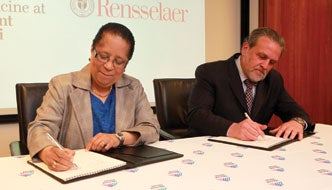Rensselaer will strengthen its strategic partnership with the Icahn School of Medicine at Mount Sinai on the launch of the new Mount Sinai Institute of Technology (MSIT).
Announced Dec. 4 as part of a $100 million public-private initiative to boost biotechnology innovation in New York, MSIT aims to educate a new generation of experts and create new technologies to help address and solve the world’s most critical health-care challenges. MSIT is supported by $5 million from the city of New York.
“The Mount Sinai Institute of Technology is a robust extension of our partnership with the Icahn School of Medicine,” said President Shirley Ann Jackson. “This research and technology hub will enable innovation and discovery in biomedical technologies, health-care analytics, and education, and will drive economic development and improved health care. Rensselaer will work closely with Mount Sinai to foster the growth of the MSIT, while expanding opportunities to build Rensselaer-driven biomedical technologies upstate.”

President Jackson and Dennis Charney, executive vice president for academic affairs at the Mount Sinai Medical Center, at the affiliation agreement signing in May.
“We are grateful to the New York City Economic Development Corporation and the administration of Mayor Michael Bloomberg for their generous support in helping to make MSIT a reality,” said Dennis Charney, the Anne and Joel Ehrenkranz Dean of Icahn School of Medicine at Mount Sinai and executive vice president for academic affairs at the Mount Sinai Medical Center. “The city has long recognized the need to expand applied science education and to establish research facilities for these efforts. The work that we’ll carry out at the Institute—from basic research to developing medical technology and devising effective treatments—will ultimately go a long way toward helping improve patient outcomes and the quality of life for people in New York City and beyond.”
MSIT seeks to transform biomedicine through discovery and development of technology-based solutions to critical unmet health-care needs. Students and faculty will engage in academic research, product development, and active entrepreneurship in areas including Big Data, cloud computing, social networking, scientific and clinical simulation, tissue engineering, sensors, microprocessors, robotics, mechatronics, drug delivery and nanomedicine, and other areas, ultimately conferring graduate degrees in Design, Technology, and Entrepreneurship (Ph.D.) and Biomedical Informatics (M.S.).
As part of the MSIT program, which will begin in the fall of 2014, Rensselaer and Mount Sinai will collaborate on the creation of five multidisciplinary research teams. Comprised of faculty members, postdoctoral scholars, and students from both institutions, each team will be devoted to solving a specific technology problem.
This collaboration furthers the partnership between Rensselaer and Mount Sinai, which in May announced an affiliation agreement to collaborate on educational programs, research, and development of new diagnostic tools and treatments that promote human health. The affiliation leverages the expertise of Rensselaer in engineering and invention prototyping and the expertise of Mount Sinai in biomedical research and patient care to develop joint educational programs, create complementary research programs, and to seek joint research funding.
The affiliation expands the research conducted at both institutions in the areas of neuroscience and neurological diseases, genomics, imaging, orthopaedics, cancer, cardiovascular disease, and scientific and clinical targets. Funding for projects will be sought on topics including precision medicine, drug discovery, stem cell biology, robotics and robotic surgery, novel imaging techniques, cellular engineering, and computational neurobiology.
See the full announcement.
For more on the alliance between Rensselaer and Mount Sinai.


